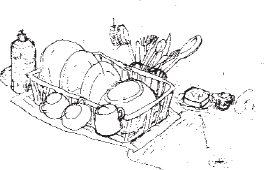Sara, Book 1 (12 page)

Sara, your work is not to look for the perfect place where only the things you want exist. Your work is to look for the things you want in
every
place.
“But why? What good does that do?”
Well, for one thing, you would feel better, and, for another thing,
as you begin to notice more things that you want to
see, more of those things begin to become part of your
experience.
It gets easier and easier, Sara.
“But, Solomon, aren’t some places a lot worse than others? I mean school is just the worst place in the world to be.”
Well, Sara, it’s easier to find positive things in some places than others, but that can become a pretty big trap.
“What do you mean?”
When you see something you don’t like and you decide to go somewhere else to get away from it
,
you usually take it with you.
“But Solomon, I wouldn’t take those mean teachers or rotten kids with me.”
Well, maybe not those very same ones, Sara, but you would meet others, very much like them, everywhere you would go. Sara, remember “Birds of a Feather.” Remember the “Light Board.” When you see things you don’t like and you think about them and talk about them, you become like them, and then everywhere you go, they are there, too.
“Solomon, I keep forgetting all of this.”
Well, Sara, it’s natural to forget this, because you’re like most people who have learned to respond to conditions. If good conditions are around you, you respond by feeling good, but if there are bad conditions around you, you respond by feeling bad.
Most people think that they must first find perfect conditions, and once they find those perfect conditions, then they can respond by being happy. But that is very frustrating to people, because they discover, very soon, that they cannot control the conditions.
What you’re learning, Sara, is that you aren’t here to find perfect conditions. You’re here to choose things to appreciate— which causes you to vibrate like the perfect conditions—so that you can then attract perfect conditions.
“I guess,” Sara sighed. This all seemed too big to understand.
Sara, it really isn’t as complicated as it seems. In fact, people make it much more complicated as they try to make sense of all of the conditions that surround them. It can get very confusing if you’re trying to figure out how every condition is created, or which conditions are right and which ones are wrong. You can drive yourself crazy trying to sort all of that out. But if you will just pay attention to whether your valve is open or closed, then your life will be much simpler and much happier.
“My valve? What do you mean?”
Sara, in every moment, a stream of pure, positive energy is flowing to you. You might say it’s a bit like the water pressure in your house. That water pressure is always there, right up against your valve. And when you want water in your house, you open the valve and let the water flow in. But when the valve is closed shut, the water doesn’t flow in. It’s your work to keep this valve to Well- being open. It’s always there for you, but you must let it in.
“But Solomon,” Sara protested, “what good does it do for me to keep my valve open in a school where everyone else is angry and mean?”
First of all, when your valve is open, you won’t notice so much of the meanness, and some of it will change right before your eyes. There are many people who are sort of teetering on the edge of an
open or closed valve, and when they come into contact with you and your valve is wide open, they easily join you in a smile, or a nice interchange. Also, you must remember that an open valve is not only affecting what is happening right now. It’s affecting tomorrow and the next day. So, the more todays that you’re feeling good, the more conditions of tomorrow and the next
day will be pleasing to you. Practice this, Sara.

Make a decision that no condition, no matter how bad it may seem to you in the moment, is worth your closing your valve. Decide that keeping your valve open is the most important thing.
Here are some words to remember, Sara, and to say, as often as you can: “I am going to keep my valve open anyway.”
“Well, all right, Solomon,” Sara replied meekly, feeling tentative about the whole thing, but remembering how much better things, on the whole, had been going since she had tried some of the other techniques Solomon had offered.
“I’ll practice this. I hope it works,” Sara called back over her shoulder as she left Solomon’s thicket.
It would certainly be nice to be able to feel good no matter what. That really is what I want.

S
ara’s mother’s car was in the driveway.
That’s strange,
Sara thought.
She’s not supposed to be home this early.
“Hi, I’m home,” Sara called out, as she opened the front door, surprising herself with such an unusual announcement of her arrival. But no answer came back. Sara put her books down on the dining room table and called again, walking through the kitchen into the hallway leading to the bedrooms, “Anybody home?”
“I’m in here, honey,” Sara heard her mother’s quiet voice. The drapes in her mother’s bedroom were closed, and Sara’s mom was lying on her bed with a pink rolled towel across her eyes and forehead.
“What’s wrong, Mom?” Sara asked.
“Oh, I just have a headache, honey. It’s been hurting all day, and finally I decided I couldn’t stay at work another minute, so I came home.”
“Is it better now?”
“It feels better to have my eyes closed. I’ll just lie here for a little while. I’ll be out later. Close the door for me, and when your brother comes home, tell him I’ll be out later. Maybe if I can sleep for a little while, I’ll feel better.”
Sara tiptoed out of the room and gently closed the door. She stood in the dark hallway for a bit, trying to decide what to do next. She knew what chores should be tended to, as she had done those same chores every day for as long as she could remember, but everything felt different somehow.
Sara couldn’t remember the last time her mother had stayed home from work, sick, and there was something very unsettling about all of this. Sara had a knot in her stomach and she felt disoriented. She hadn’t realized how her mother’s usual stability and good humor had such a stabilizing influence on her own day.
“I don’t like this,” Sara said aloud. “I hope Mom feels better, fast.”
Sara.
Sara heard Solomon’s voice.
Does your happiness depend on the conditions around you? This might be a good opportunity to practice.
“Okay, Solomon. But how do I practice? What am I supposed to do?”
Just open your valve, Sara. When you feel bad, your valve is closed. So try to think thoughts that feel better until you feel your-valve open up again.
Sara went out into the kitchen, but her thoughts were still mostly about her mother lying in her bed in the next room. Her mother’s purse was on the kitchen table, so Sara couldn’t stop thinking about her.
Make a decision to do something, Sara. Think about your chores, and decide to do them in record time tonight. Think about doing something extra, something beyond your normal chores.
And with that idea, Sara was inspired to instant action. She moved quickly and certainly, picking up things from around the house that had been misplaced slowly, over many hours last evening before bedtime, by various members of the family. She gathered and stacked the newspapers that seemed to cover most of the living room floor, and then dusted the table tops in the living room. She cleaned the sink and the bathtub in the family’s only bathroom. She emptied the garbage cans from the kitchen and the bathroom. She tidied the papers strewn across her father’s great big oak desk, which was awkwardly crammed in the corner of the living room, being careful not to move anything too far from where her father had placed it.
She was never certain if there was order to his disorder, but she didn’t want to cause any problems. Her father actually spent very little time at that desk, and Sara often wondered why such a big piece of the living room had to be devoted to it. But it seemed to give her father a place to think, and, more important, a place to stash things he didn’t want to think about right now.
She was moving quickly, with strong, decisive purpose, and it wasn’t until she made the decision not to use the vacuum cleaner on the living room carpet, because she didn’t want to disturb her mother, that she realized how good she had come to feel in such a short time. But, in deciding not to vacuum, and perhaps disturb her resting mother, her attention was drawn back to the negative condition; and that dull, icky feeling came back into her stomach.
Wow!
Sara pondered.
That’s amazing. I can actually see that the way I feel has only to do with what I’m giving my attention to. The conditions didn’t change, but my attention did!
Sara felt elated. She realized something very important. She had discovered that her joy is truly not dependent on anyone or anything else.
Then Sara heard her mother’s bedroom door open, and her mom emerged from the hallway into the kitchen. “Oh, Sara, everything looks so nice!” her mother exclaimed, obviously feeling much better.
“Did your headache go away, Mom?” Sara asked tenderly.
“It’s much better now, Sara. I was able to rest for a while because I could tell you were out here taking care of things. Thank you, sweetheart.”
Sara felt wonderful. She knew that she hadn’t actually
done
much more than she did every single day after school. Her mother wasn’t appreciating Sara for her action. Her mother was appreciative of Sara’s open valve.
I can do this,
Sara decided.
I can keep my valve open no matter the conditions.
Sara remembered Solomon’s affirmation:
I will keep my valve open—anyway!


V
ery nice, Sara—an A.
Sara read the words scrawled across the top of yesterday’s assignment, just handed back to her by Mr. Jorgensen.